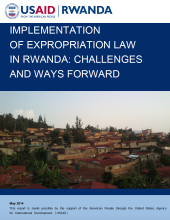Land Library Search
Through our robust search engine, you can search for any item of the over 73,000 highly curated resources in the Land Library.
If you would like to find an overview of what is possible, feel free to peruse the Search Guide.
/ library resources
Showing items 1 through 9 of 18.This report presents the results of a small scale household survey that was conducted in May
2015 to assess the extent to which rural Rwandan citizens are vulnerable or resilient to
environmental, market and land tenure risks and the level they understand the laws and rights
Rwanda has nearly 280,000 hectares of wetlands, almost 11% of the country’s total
area.1 These wetlands provide critical habitats for wildlife and biodiversity, maintain
important hydrologic processes that help to clean and protect ground and surface
Rwanda is developing at a remarkably rapid pace, and with that development has come a
multitude of corresponding changes to the orientation and use of land throughout the country.
In light of these changes, law n°18/2007 of 19/04/2007 relating to expropriation in the public
To say that access to land is one of the most important conditions for the
empowerment of African women, would be an understatement. The cultivation of land is one
of the main sources of income and economic wealth depends strongly on a well-elaborated
This policy brief aims to inform policy and current practices governing land expropriation in Rwanda drawing on recent research carried out by the LAND Project.
As Parliamentary gender quotas have become increasingly popular, so too
has the debate surrounding their effectiveness in enhancing women’s
representation and gender equality in governments around the world. Women offer
After remarkable social and economic reconstruction since 1994, Rwanda aspires to become a middle income country by 2020 with a strong focus on inclusive growth. In this context the Government of Rwanda (GoR) has recognized the critical nature of land policy and agricultural growth.
This brief discusses a pilot intervention in Rwanda led by the Belgian
NGO, RCN Justice & Démocratie, with support from the International
Development Law Organization (IDLO) and the Belgian Government. A
more detailed and complete discussion of the pilot is given in Lankhorst
The world today faces a wide range of critically important issues, whose resolution require inter- national collaboration of various stakeholders. Environmental conservation and conflict resolution are such examples.









